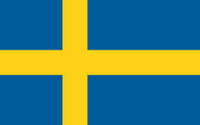Sweden to the right
 Sweden held a general election today, and it seems that the center-right coalition led by Moderate Party leader Fredrik Reinfeldt is poised to take over from the governing center-left (red-green) coalition led by Prime Minister and Social Democratic Party leader Goran Persson. (The BBC reports here.)
Sweden held a general election today, and it seems that the center-right coalition led by Moderate Party leader Fredrik Reinfeldt is poised to take over from the governing center-left (red-green) coalition led by Prime Minister and Social Democratic Party leader Goran Persson. (The BBC reports here.)Sweden uses a variation of the List Proportional Representation electoral system. The 349 seats in the national assembly, the Riksdag, are apportioned according to parties' percentage of popular vote. 310 members are elected from 29 electoral districts and a further 39 are elected at the national level. These 39 "adjustment seats" ensure proportionality. (For more on Sweden's electoral system, as well as historical election results, see here and here.)
Preliminary results show that Reinfeldt's center-right coalition won 178 seats, while Persson's center-left coalition won 171. The Social Democrats still won the most seats of any party, however, with 130, well ahead of the Moderates at 96. (For more on the election, including updated results, see here. The BBC provides a Q&A here.)
What does this mean for Sweden?
As the BBC notes, "[t]he Social Democrats have governed Sweden for all but 10 of the 89 years since the country introduced parliamentary government". The Swedish economy is fairly strong, but Persson's "the administration has not had a smooth ride". Voters rejected the Euro in a 2003 referendum and there have been "a number of domestic scandals". Plus, the opposition parties in the center and on the right were "united".
Reinfeldt refers to his party as the "New Moderates," and his coalition may have won because Sweden's long-established welfare system, a cornerstone of Swedish society built by the Social Democrats, has become an acceptable target for political criticism: "Key issues in the election included whether Sweden's generous welfare model must reform for it to survive in the global economy." Indeed, Reinfeldt has "promised to cut taxes and reform Sweden's cradle-to-grave welfare state".
The question is whether the New Moderates will succeed in creating a New Sweden. Given the Social Democrats' position as the country's established governing party and the closeness of this election -- Reinfeldt's coalition won by about one percent -- any center-right era of reform could turn out to be both unsuccessful and short-lived. (See the article at Wikipedia for more on the election campaign, as well as for background.)



0 Comments:
Post a Comment
<< Home